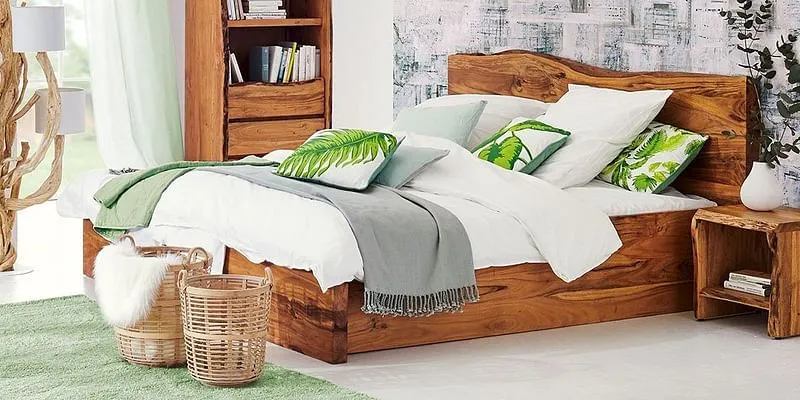Starting with Rs 50K, this man moved from his traditional family business to build a D2C furniture brand
Rajasthan-based Saraf Furniture is an online D2C furniture brand founded by Raghunandan Saraf. The brand manufactures and sells 6,000 varieties of furniture, including beds, boxes, drawers, tables, clocks, and more.
Raghunandan Saraf grew up observing his family’s furniture export business as a child. His family has been part of the unorganised furniture industry for almost four decades.
Post his graduation from Shri Ram College of Commerce, Delhi, Raghunandan, after returning to his hometown in Sadarshahr, Rajasthan, realised the need to transform his family’s business, and the entire furniture industry.
According to IKON Marketing Consultant, about 85-90 percent of the national furniture production comes from regional, small-sized firms.
In an effort to bring his family business to the organised sector, Raghunandan launched in 2014 as an independent, direct-to-consumer (D2C) brand.
In fact, his family business in this space helped him understand the market before launching the company. He says, “I knew the product and market, and all I had to do was to customise the furniture according to the demand and consumer needs.”
At present, the platform claims to offer 6,000 varieties of furniture, ranging from beds, boxes, drawers, tables, and clocks, among others, priced between Rs 2,000 and Rs 2.8 lakh.
Overcoming initial hiccups
Between 2010-2015, India’s internet economy was steadily rising, and Saraf Furniture had the first-mover advantage as there was hardly any competition in the market.
It was also a time when startups like Urban Ladder and Pepperfry, and ecommerce platforms like Flipkart and Amazon, were starting to emerge in the Indian market.
Nonetheless, the company had its share of challenges to overcome. One of the biggest challenges was hiring the right people who shared the company’s vision.
Another challenge was to spread awareness about the brand. The company had to rely on digital marketing strategies and tools, including TVC and A/B testing, to bring more customers to the platform, unlike now, where companies can list themselves on ecommerce platforms to gain traction.
In fact, the brand’s position was briefly threatened when Amazon and Flipkart made inroads in the market. However, Saraf Furniture stayed clear by focussing on providing quality products and services to its customers.
Starting with Rs 50,000 investment in 2014, the company clocked Rs 30 crore turnover in FY15. In FY19, the company raked in Rs 90 crore revenue.
For its Sheesham-based furniture, the company sources its raw materials from Punjab and Haryana. Saraf Furniture has eight manufacturing units in Sardarshahr and Churu in Rajasthan. It also has warehouses set up in cities it serves to ensure timely and right delivery of products.

Scaling further up
With increased internet and smartphone penetration in India, over the years, Saraf Furniture is seeing the demand getting stronger from Tier-II and III cities.
Besides selling via its D2C channel, the company has physical stores in various cities, including Bengaluru, Delhi, Hyderabad, and Ahmedabad, among others, and in Tier-II cities like Surat, Lucknow, etc.
Although the company has experience centres in many Indian cities, Raghunandan says Saraf Furniture will always remain an online-first brand.
“Having experience stores helps in conversions. People who come to our stores eventually buy the product online. But these outlets are important because they act as support centres to the online model,” Raghunandan claims.
In fact, these stores have led the company to register a 10x increase in sales in the above-mentioned cities, he says.
Acquisitions, misses, and what lies ahead
According to Statista, as of 2021, the Indian furniture market has generated $216,293 million in revenue. In fact, between 2021 and 2025, the industry is expected to grow at a CAGR of 4.71 percent annually.
India houses numerous furniture giants, including Nilkamal, Godrej, Zuari Furniture, IKEA, Pepperfry, and several others.
Raghunandan is bullish on the future of the Indian furniture industry, which according to him, will become more organised in the coming years.
Additionally, several events — demonetisation (in 2016), the introduction of the Goods and Services Tax (GST), and most recently, the coronavirus pandemic — have bolstered India’s digital transformation journey including that of this sector.
During demonetisation and the pandemic, Saraf Furniture saw sales increasing on its D2C channel.
Raghunandan shares that people were spending time at home, and as a result, were buying more furniture during the pandemic-led lockdown.
In May 2020, the company ventured into the home decor space and launched items such as mattresses, carpets, and lamps.
The company is also in the process of acquiring a third-party logistics startup to help support its logistics and warehousing verticals.
Going forward, the company plans to expand more stores in India, as well as venture into the global market, beginning with the UK.
Edited by Suman Singh









